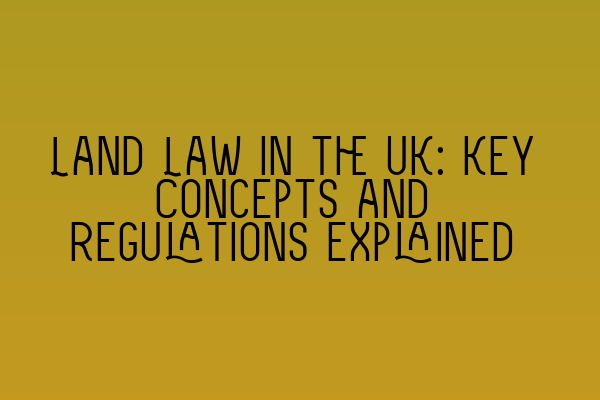Land Law in the UK: Key Concepts and Regulations Explained
When it comes to property law in the UK, understanding land law is essential. Land law encompasses a wide range of concepts and regulations that govern the ownership, use, and transfer of land. Whether you are a property owner, landlord, tenant, or someone interested in the property market, having a solid grasp of land law is crucial.
In this article, we will explore the key concepts and regulations of land law in the UK, providing you with valuable insights into the intricacies of this area of law. So, let’s dive in!
1. Land Ownership
The first fundamental concept in land law is land ownership. In the UK, land can be owned either freehold or leasehold. Freehold ownership is the most complete form of ownership, giving the owner total control over the land. On the other hand, leasehold ownership grants the owner a fixed-term interest in the land, subject to certain conditions and restrictions.
Understanding the various forms of land ownership is vital when buying or selling property. It is advisable to consult a property law solicitor, who can guide you through the legal intricacies and protect your interests.
2. Property Registration
Property registration is the process of officially recording property ownership and interests in the land registry. In the UK, the Land Registry is responsible for maintaining a public register of land and property ownership.
Registering your property not only provides security and certainty of ownership but also makes subsequent transactions, such as selling or mortgaging the property, more straightforward. It is crucial to ensure that all necessary documentation is properly prepared and submitted to the Land Registry to avoid any complications.
3. Easements and Covenants
Easements and covenants are rights and obligations that attach to land. Easements are rights that one party has over another’s land, such as a right of way or a right to receive services. Covenants, on the other hand, are obligations imposed on the owner of the land, such as maintenance responsibilities or restrictions on land use.
Understanding easements and covenants is crucial when purchasing or developing property. It is essential to conduct thorough due diligence to identify any existing rights or obligations that may affect the use and value of the land.
4. Mortgages and Charges
Mortgages and charges are forms of security interests in land. A mortgage is a loan secured against property, usually for the purpose of purchasing the property. In the event of default, the lender has the right to take possession of the property and sell it to recover the outstanding debt.
Charges, on the other hand, are similar to mortgages but are used to secure debts other than purchase money. This could be, for example, a charge to secure a business loan. Understanding the implications of mortgages and charges is vital when entering into any financial arrangements related to property.
5. Leases and Tenancies
Leases and tenancies are legal arrangements that govern the possession and use of land or property. Leases are typically long-term agreements that grant exclusive possession of the property to the tenant. Tenancies, on the other hand, are shorter-term agreements, such as assured shorthold tenancies commonly used in residential renting.
Understanding the rights and responsibilities of both landlords and tenants is essential for maintaining a harmonious landlord-tenant relationship. It is advisable to seek legal advice and ensure that all necessary documents, such as tenancy agreements, comply with the relevant legislation.
6. Land Disputes and Remedies
Land disputes can arise due to various reasons, such as boundary disputes, trespassing, or breaches of covenants. Resolving these disputes can be complex and involve legal proceedings.
In cases of disputes, it is advisable to seek legal advice from a property law solicitor experienced in handling land disputes. They can guide you through the appropriate legal remedies, such as negotiation, mediation, or litigation, to resolve the matter efficiently and protect your rights.
In Conclusion
Land law in the UK encompasses a wide range of concepts and regulations that are essential to understanding the intricacies of property ownership, use, and transfer. Whether you are a property owner, landlord, tenant, or someone interested in the property market, having a solid grasp of land law is crucial.
If you would like to enhance your understanding of property law and land law further and prepare for the SQE exams, we offer comprehensive SQE 1 and SQE 2 preparation courses. Additionally, you can also practice with SQE 1 practice exam questions and SQE 1 practice mocks FLK1 FLK2. Stay updated with the latest SRA SQE exam dates by following the link.
For any legal assistance or advice related to land law or property law in general, do not hesitate to reach out to the experienced solicitors at SQE Property Law & Land Law. We are here to provide you with expert guidance and ensure that your property matters are handled with utmost professionalism and efficiency.
Disclaimer: This article is for informational purposes only and should not be construed as legal advice. Always consult a qualified solicitor for legal matters related to land law or any other area of law.
Tags: Land law, property law, land ownership, property registration, easements, covenants, mortgages, charges, leases, tenancies, land disputes, legal remedies
